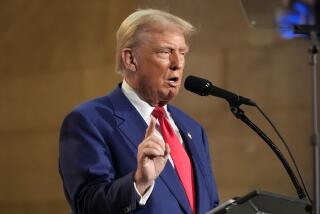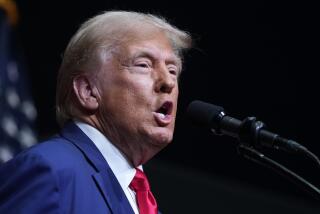Bush Balances High Tone, Criticisms
- Share via
DAYTON, Ohio — Opening a week meant to highlight his commitment to bipartisanship, presumptive Republican presidential nominee George W. Bush promised to strike a more civil tone in Washington and then jarringly launched a new offensive against the veracity and motivation of his Democratic opponent.
Those somewhat dissonant notes underscored the delicate balance Bush is seeking as he promises to temper the partisan hostilities in Washington even as he repeatedly criticizes the personal ethics and integrity of Vice President Al Gore and President Clinton.
Meeting with residents here to discuss his proposals for helping the poor accumulate savings, Bush painted himself as a politician committed to narrowing partisan differences--a theme he is expected to stress again tonight at a major Republican fund-raiser in Washington.
Touting endorsements from two current and two former Democratic Texas state legislators who traveled with him to Ohio, Bush said the backing “sends a signal to America about the kind of president I’d be--someone who is willing to work with both Republicans and Democrats.”
Bush even gibed Republican congressional leaders when asked if they had contributed to the confrontational climate in the capital.
“I know it all starts with the leader and the president sets the tone,” Bush said. “On occasion, the Republicans have tried to respond in like manner, and they haven’t done well in doing so.”
But Bush’s own tone was much more confrontational as he responded to Gore’s policy criticisms. Bush accused Gore of misrepresenting his economic plan in his speech Tuesday--the first of a series the vice president’s campaign says is meant to clarify the differences in the race.
Bush said that Gore had significantly overstated the cost of his proposed tax cut--which Bush says will cost $1.3 trillion over 10 years but which Gore charges will cost more than $2 trillion and demand massive cuts in federal programs to fund.
“He is willing to stretch the truth and exaggerate in order to get ahead,” Bush said. “I am running against a person who is so anxious to become the president that he will do whatever it takes.”
Bush said that such accusations do not undermine his promise to provide a more civil political tone because they amount to “defending my record.”
Opening a new front in the economic debate, Bush’s campaign released a paper Tuesday alleging that Gore has promised almost $1.9 trillion in net new spending over the next decade--a sum they describe as significantly larger than their proposed tax cut.
The Bush campaign reached that figure by adding the roughly $1 trillion in new spending Gore has proposed over the next decade to nearly $900 billion in additional spending that is already included in the baseline budgets prepared by the Clinton administration.
Although Gore is trying to frame the budget debate as a choice between fiscal discipline and a return to deficits, the release of those numbers suggest the Bush campaign will work to present the options as a choice between new spending and tax cuts.
“We both use the non-Social Security surplus at roughly the same amount. He uses it to increase spending for more government; we use much of it for tax relief, believing the more money that is sent to Washington, the more is spent,” said Ari Fleischer, the Bush campaign’s deputy communications director. “How can he say that our plan is risky if his plan spends more?”
Doug Hattaway, a spokesman for the Gore campaign, said that such criticism is misplaced because much of the new spending in the Gore plan is targeted toward the “fiscally responsible” goal of stabilizing Social Security and Medicare. “Bush is right: There is an enormous difference in priorities,” Hattaway said. “Gore wants to use most of the surplus to save Social Security and shore up Medicare, while Bush wants to give it away in tax cuts to the rich.”
Bush was in Ohio, a key battleground state in November, to tout his support for “individual development accounts,” an idea meant to help low-income workers increase their savings. Bush has proposed a $1-billion, five-year plan to give banks tax credits when they agree to match savings set aside by low-income families of up to $300 a year.
The idea has substantial bipartisan support, and Clinton has backed a version of it since 1992.
Bush was joined by four Texas Democrats, including two former state representatives, Hugo Berlanga and Mark Stiles, who had served on the state steering committee for Gore’s 1988 presidential bid. In endorsing Bush, all four praised him for encouraging a bipartisan atmosphere in Austin.
Later on Tuesday, Bush announced that he had named former Republican Rep. Richard B. Cheney, the Defense secretary during his father George Bush’s administration, to lead his search for a vice presidential running mate.
More to Read
Get the L.A. Times Politics newsletter
Deeply reported insights into legislation, politics and policy from Sacramento, Washington and beyond. In your inbox twice per week.
You may occasionally receive promotional content from the Los Angeles Times.










